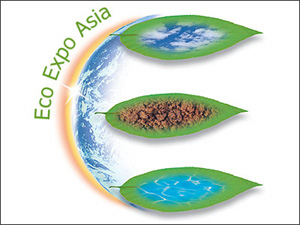
| Eco Expo Asia (Fachmesse) |
|||||||||
| Wann? | 28.10.2008 - 31.10.2008 | ||||||||
| Wo? | HK-***** Hong Kong, Hall 5, AsiaWorld-Expo, Hong Kong | ||||||||
| Was? |  Eco Expo Asia - Creating environmental business opportunities in Asia Eco Expo Asia - Creating environmental business opportunities in Asia
Many rising to meet waste management problems in Asia Hong Kong, has a pressing need for the adoption of advanced technologies to reduce the volume of waste as the existing landfills are depleting fast. The upcoming Integrated Waste Management Facilities (IWMF) will use incineration as the core technology to reduce waste volume and to recover energy. Adopting the state-of-the-art thermal technology, the incinerator will comply with stringent emission standards. The facility will generate electricity that will be put to good use as well. In India, the Ecological Solid Waste Management Act, which calls for the closure of all open dumpsites within three years, was passed in 2000 yet to this day, there are still 826 open dumpsites all over the country. To shut down all these dumpsites, advanced waste treatment technologies will no doubt be needed to address solid waste disposal. Japan also faces challenges of solid waste treatment as the volume and complexity of domestic and industrial waste has been increasing. The new Waste Treatment Facilities Development Programme, formulated every five years, has just been revised and approved. The new programme will emphasise the promotion of the utilization of biomass derived from wastes and the stock management of waste treatment facilities. Exhibit Highlights The area of waste management has immense business potential in Asia. Showcasing in Eco Expo Asia 2008 will be the latest machines and plants for mechanical and biological treatment of solid wastes and biomass. Every step of the waste management process will be featured, from shredding technology to composting technology. Doppstadt Calbe GmbH from Germany and Komptech GmbH from Austria are two major suppliers of such equipment. The new packages today in Asia Research and development in Thailand has paid off to tackle the problem of overusing plastic bags and containers. There are now biodegradable plastics which are made from potatoes, corn, grains, wild oats and other such crops. They can be broken down under certain conditions into harmless natural compounds and used as fertilizers. The production uses less energy and generates fewer greenhouse gases and contains no toxins. The Singapore Packaging Agreement represents a landmark collaborative effort between the government, industry and NGOs to work towards reducing waste in Singapore. This 5-year agreement is voluntary and will provide greater flexibility for the industry to adopt cost effective solutions to reduce packaging waste. The food and beverage industry will be addressed first as this is one of the most commonly seen types of packaging waste today. Under the new regulations in China, bags under 0.025mm thick are banned and shoppers must now pay for carrier bags. Ultra-thin bags are the main target because they are normally used once and then thrown away. This drive to kick plastic bag habits will hopefully accustom people to get used to carrying their own bags when they go shopping. Exhibit Highlights With trends of packaging being more eco-friendly, Eco Expo Asia 2008 will be showcasing some of the green products including EcoPak®, Malaysia's eco-friendly food containers that are biodegradable. These containers are made out of natural fibre and are processed in an organic way with no harmful chemical additives and colourings. Tested to preserve freshness of foods even after long hours of storage, EcoPak®'s products have been extremely receptive in the retail market. Be a part of this international environmental expo today and create networking and eco-friendly business opportunities! |
||||||||
| Wer? |
| ||||||||
| |||||||||